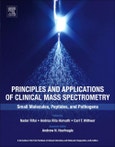Principles and Applications of Clinical Mass Spectrometry: Small Molecules, Peptides, and Pathogens is a concise resource for quick implementation of mass spectrometry methods in clinical laboratory work. Focusing on the practical use of these techniques, the first half of the book covers principles of chromatographic separations, principles and types of mass spectrometers, and sample preparation for analysis; the second half outlines the main applications of this technology within clinical laboratory settings, including determination of small molecules and peptides, as well as pathogen identification. A thorough yet succinct guide to using mass spectrometry technology in the clinical laboratory, Principles and Applications of Clinical Mass Spectrometry: Small Molecules, Peptides, and Pathogens is an essential resource for chemists, pharmaceutical and biotech researchers, certain government agencies, and standardization groups.
Please Note: This is an On Demand product, delivery may take up to 11 working days after payment has been received.
Table of Contents
1. Chromatography 2. Mass spectrometry 3. Sample preparation for mass spectrometry applications 4. Mass spectrometry applications in infectious disease and pathogens identification 5. Development and Validation of Small Molecule Analytes By Liquid Chromatography-Tandem Mass Spectrometry 6. Proteomics
Authors
Nader Rifai Professor Department of Pathology Harvard Medical School; The Louis Joseph Gay-Lussac Chair in Laboratory Medicine Boston Children's Hospital; Director of Clinical Chemistry Laboratory Medicine Boston Children's Hospital Boston, Massachusetts. A. Rita Horvath Professor, School of Medical Sciences, University of New South Wales, Sydney, Australia. Andrea Rita Horvath's key research interests include evidence-based laboratory medicine (EBLM) including evidence-based monitoring, guideline development, and evaluation of new biomarkers and overdiagnosis. She holds advisory roles on test utilization and reimbursement policy at the National Prescribing Service of Australia and Medicare. She has published 160 research papers and 16 book chapters and has been an invited speaker at over 100 international conferences. Her national and international leadership positions include Chair of the IFCC Committee on EBLM (2003-2008); European Communities Confederation of Clinical Chemistry and Laboratory Medicine (EC4) Secretary (2005-2007); President of the Hungarian Society (2005-2008) and the Hungarian College of Laboratory Medicine (2008-2009); President-Elect (2007-2009), President (2009-2011) and Past President (2012-2013) of the European Federation of Clinical Chemistry and Laboratory Medicine (EFLM); chair of the EFLM working group on Test Evaluation (2011-2015) and member of the Board of Directors of the American Association of Clinical Chemistry (2014-2016). Carl T. Wittwer Professor of Pathology, University of Utah School of Medicine, Salt Lake City, UT USA. Dr. Wittwer is currently the medical director of Immunologic Flow Cytometry at Associated Regional and University Pathologists (ARUP), Salt Lake City, UT. In the early 1990s, he initiated molecular diagnostics at ARUP by forming its first molecular lab. From 2002 to 2012 he served as medical director of the Advanced Technology Group at ARUP. He is board certified in anatomic and clinical pathology by the American Board of Pathology.In 1990, Dr. Wittwer co-founded BioFire Diagnostics, a company that has grown to over 600 people. He is the primary inventor of the LightCycler® system, and he served as Chairman of the Board from 2012-2014 until the company was acquired by BioMerrieux. In 2003 the R.A.P.I.D.®, a portable version of the LightCycler, was selected as the real-time PCR platform for military defense against biologic weapons by the US government. Dr. Wittwer holds 37 US patents and their foreign equivalents. He received small business innovation awards in 1999 and 2002, the State of Utah Governor's Medal for Science and Technology in 2003 and the IQLM Technical Advancement Award in 2005. Since 2003, he has directed the State of Utah Center of Excellence on "Homogeneous DNA Analysis. Andy Hoofnagle Professor, Department of Laboratory Medicine
Head, Division of Clinical Chemistry, University of Washington
Seattle, WA USA. Andy Hoofnagle received his undergraduate education at Cornell University. He obtained his medical degree from the University of Colorado Health Sciences and his PhD from the University of Colorado, Boulder as part of the Medical Scientist Training Program. During his residency and chief residency in Clinical Pathology in the Department of Laboratory Medicine at the University of Washington, he did his post-doctoral work in the laboratory of Jay Heinecke, Department of Medicine. He was then promoted to Assistant Professor of Laboratory Medicine and now serves as the Director of Clinical Mass Spectrometry.
Dr. Hoofnagle's laboratory focuses on using proteomic and metabolomic approaches to investigate the intersection of inflammation and lipid metabolism. His laboratory is pioneering the use of immunoaffinity peptide enrichment strategies of analyte-specific peptides from tryptic digests in the clinical analysis of low-abundance serum proteins. The laboratory has developed assays for small molecule analytes, including arginine, arginine metabolites, and vitamin D, which are being used in basic science and large-scale clinical studies. Several mouse models are being used to assess the importance of complement regulatory proteins in insulin sensitivity and lipid metabolism. All of these studies are in collaboration with outstanding investigators from the University of Washington and elsewhere.








